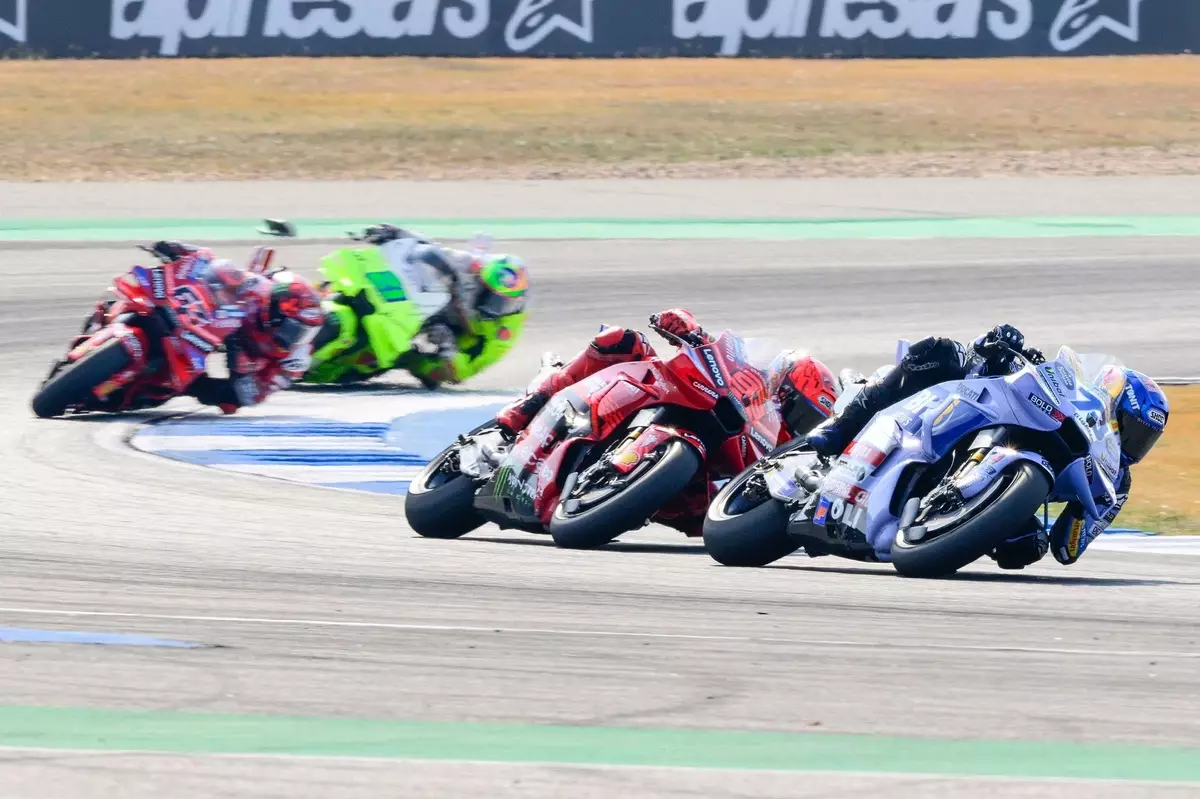MotoGP races have always been a microcosm of rivalry and strategy, manifesting in thrilling bouts of speed on two wheels. The recent 2025 Thailand Grand Prix presented a prime example of this, especially in the context of the Marquez brothers’ performance and Francesco Bagnaia’s insightful commentary. As the dust settled in Buriram following the season opener, the event left spectators pondering the nuances of racing strategy and the inherent rivalries that shape this high-octane sport.
Marc Marquez has long been a dominant force in MotoGP, and his performance at the Thailand Grand Prix reaffirmed his prowess. Starting from the pole position, Marquez raced ahead, demonstrating why he is hailed as one of the sport’s greats. However, his strategy was notably complex; he chose to slow down unexpectedly early in the race, seemingly playing with the dynamics of competition. Observers were quick to note the significant gap he maintained over his competitors. When Marquez exhibited a drop in pace, it wasn’t merely a slip but rather a calculated decision to manage tyre temperatures. This critical situation became a pivotal aspect of the race, allowing brother Alex Marquez to stay in contention.
In a sport so deeply intertwined with split-second decisions, Marquez’s move not only showcased his firm grasp on racing tactics but also raised questions about his intent. Was he truly managing his resources, or was he orchestrating a spectacle for his competitors? As Bagnaia pointed out, the speed that Marc unleashed in the final laps, almost effortlessly expanding his lead, suggested he had reserves to exploit at will. This raised an intriguing dialogue about the true nature of competitive spirit in MotoGP: is it about winning at any cost or managing the race to maximize not just victory but an entire season?
Francesco Bagnaia: The Relentless Pursuer
Francesco Bagnaia, the newly signed Ducati rider, experienced a mixed bag of emotions as he closed the race in third place, visibly frustrated at the outcome. For an athlete of his caliber, settling for third is tantamount to unfinished business. Bagnaia’s critique of Marquez’s tactics encapsulates a broader challenge for racers in MotoGP: while speed is essential, strategy often plays a more significant role in outcomes. He acknowledged the need for improvement in gauging competitors’ strategies and executing overtakes effectively.
During the race, Bagnaia was in a constant struggle to keep up with the Marquez brothers, battling the front-end instability of his bike. His admission that he was unable to mount a serious challenge for the lead emphasizes the realities of competitive racing — it’s not just about raw power and speed. Instead, it’s a balancing act of mastering one’s machine, reading fellow racers, and positioning oneself correctly for potential overtakes. Yet, Bagnaia’s commitment to not reveling in the laurels of mediocrity speaks to his ambition as a seasoned competitor who desires to not just learn but also to conquer.
Ultimately, the Thailand Grand Prix was more than a race; it served as a reflection of the ongoing battles between established champions and emerging talents. Both Marquez brothers exhibited a mastery of strategy that few could rival, while Bagnaia emerged with critical insights to carry into future races. His candid acknowledgment of needing to stay closer to his rivals highlights an essential learning curve within the sport. As the season progresses, it will be crucial for riders like Bagnaia to leverage these experiences to refine their strategies and challenge the seemingly insurmountable lead held by seasoned competitors like Marc.
In an arena where split-second decisions can determine champions, the dialogue initiated at Buriram will likely frame the upcoming races. The tension between speed and strategy continues to shape the narrative of MotoGP — a reminder that in racing, as in life, success is often as much about the road traveled as it is about crossing the finish line first. As teams regroup and recalibrate for the next races on the calendar, eyes will be keenly focused on how these learnings will translate into future performances on the asphalt.


Leave a Reply